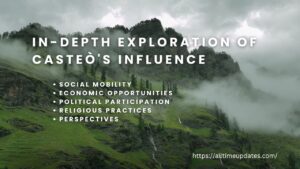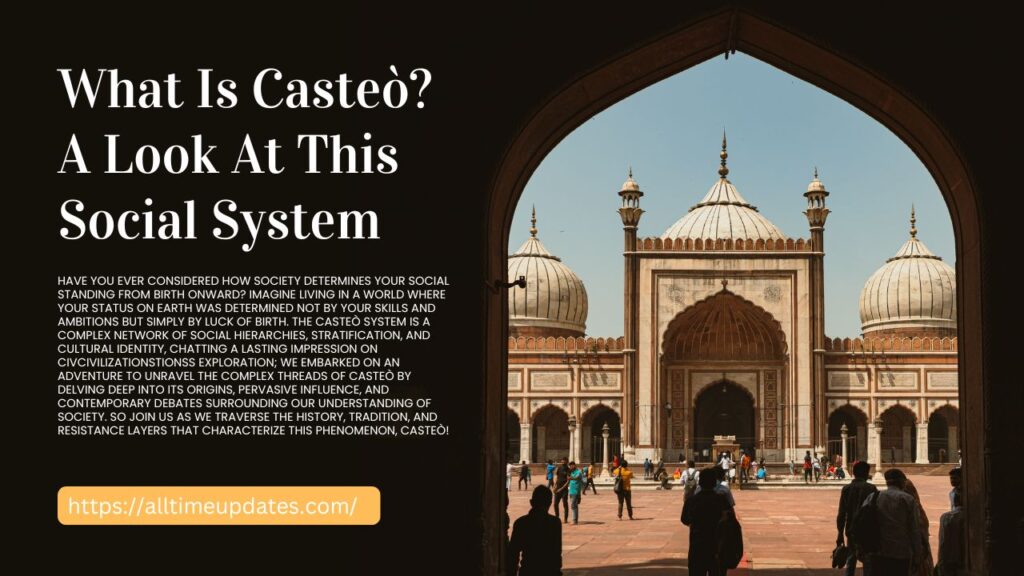Have you ever considered how society determines your social standing from birth onward? Imagine living in a world where your status on earth was determined not by your skills and ambitions but simply by luck of birth. The Casteò system is a complex network of social hierarchies, stratification, and cultural identity, chatting a lasting impression on civcivilizationstionss exploration; we embarked on an adventure to unravel the complex threads of Caste by delving deep into its origins, pervasive influence, and contemporary debates surrounding our understanding of society. So join us as we traverse the history, tradition, and resistance layers that characterize this phenomenon, Casteò!
Compelling History Of “Casteò
“Casteò” holds great historical weight, recalling stories of social hierarchy, discrimination, and identity formation. Deriving from the Portuguese word casta,” meaning breed, race, or lineage, it gradually expanded over time into broader societal meaning.
Origins And Evolution
Casteò dates back to medieval Europe, where it first denoted hereditary social classes or ranks within feudal societies. Casteòs determined one’s rights, privileges, and obligations within this system of oppression. At the same time, the rigidities of feudalism imposed social stratification with nobility, clergy, and commoners all inhabiting distinct Casteòs.
Spread And Adaptation
As European colonial powers expanded their empires around the globe, Caste spread across South Asia, Africa, and North America. Colonial administrators used Casteòs for administrative purposes, further aggravating existing population divisions and inequalities.
Legacy And Contemporary Relevance
While colonial structures may no longer exist, Caste remains present in contemporary societies through more subtle means. Postcolonial contexts remain deeply affected by Casteo’s legacy: social relationships, economic opportunities, and power dynamics remain affected; discrimination on account of perceived social status or lineage persists, perpetuating inequalities and hindering social mobility.
Representation And Resistance
Casteò has long been the focus of resistance and advocacy efforts to undermine established hierarchies and advance social justice. Movements dedicated to protecting marginalized Casteòs, such as Dalits in South Asia, illustrate this struggle against Caste-based discrimination and oppression; such movements aim to dismantle Caste barriers for inclusive societies that judge people solely according to their abilities rather than lineage.
History of Caste can be understood as a complex narrative intertwining colonialism, social hierarchy, and resistance movements. By understanding its roots and evolution, we can better comprehend its longstanding impact on contemporary societies while working toward ending Casteò discrimination and inequality in future societies.
In-Depth Exploration Of Casteò’s Influence

Casteò has long been an integral aspect of Indian society, impacting every facet of life for millions of individuals. Through our research, we explore its many ramifications – social mobility, economic opportunities, political participation, and religious practices among them – while simultaneously looking at its roots within societies around the globe.
Social Mobility
- Casteò was traditionally used as a roadblock in social mobility and has resulted in people born in lower Casteòs having only a few opportunities to advance.
- Despite efforts to increase the equality of all people, discrimination based on Casteò is still a barrier to advancement for marginalized communities.
- Examples: Dalits who have been traditionally marginalized are often subject to the stigma of society and are often excluded, which limits their opportunities for education and job chances.
Economic Opportunities
- Casteo has a significant role in how people access economic opportunities and resources.
- The members of the higher Casteòs typically have access to land, wealth, and business opportunities.
- Examples: Discrimination based on Caste regarding hiring practices as well as access to credit perpetuates economic inequalities, especially for lower Casteò persons.
Political Participation
- Casteò influences political dynamics. The Caste of the person usually affects the outcomes of elections as well as policies.
- Political parties often mobilize people along casting lines and shape their strategies for electoral campaigns and efforts to build coalitions.
- For instance, reservation policies based on Casteò seek to impart an opportunity for marginalized communities to be represented in the legislative body. However, they also bring up concerns regarding casting politics and tokenism.
Religious Practices
- Caste is interspersed with the religious practices and beliefs that influence customs, ceremonies, and norms of social behavior.
- Certain Casteòs carry particular religious obligations and privileges that dictate their role within the religious institution.
- Examples A case study is the practice of “untouchability” in Hinduism, which means that certain Casteos are deemed unclean and exempt from rituals of religious significance and rituals, which is an indication of the enduring impact of the Casteò system on the practices of religion.
Perspectives
- Positive: Many argue that identities based on Caste promote unity and social cohesion while preserving the culture and identities of the collective.
- Negative: Critics draw attention to the insidious discrimination and injustice caused by the system of Caste and advocate for its elimination as well as the advancement of equality.
- Neutral: Researchers study the significance of culture and history of the Casteò system and analyze its effects on social structures and individual lives, but without passing moral conclusions.
The impact of Caste goes over a wide range of social divides and affects everything from opportunities for economic growth to religion. When we understand the complexity of the Caste system and its effects on society, we can tackle inequality and create a more inclusive and equitable future.
Addressing Casteò In The Modern World

Today, in the global arena and present, Casteò is a constant subject of intense scrutiny and debate. From social justice discussions to affirmative Action, complex dynamics of casting are a part of many facets of our society. This article delved into the ongoing debate concerning Caste. It also examines attempts to dismantle and reform casting systems.
Debates and Controversies
- Social Justice: The idea of social justice is amid debates regarding the Casteò system. The advocates argue that dealing with inequality and historical injustice calls for proactive actions to increase the lives of minorities, including Dalits and others from lower Casteòs. On the other hand, critics voice doubts about the validity and fairness of reservation based on Caste and affirmative action policies, arguing that they have no impact on the meritocracy system and social cohesion.
- Affirmative Action: affirmative action practices, like Casteo-based restrictions regarding employment and education, have become the focus of intense controversy. Advocates view them as essential in addressing inequality and creating opportunities for historically under-represented groups. However, critics argue that these policies perpetuate the Caste divide and could result in reverse discrimination towards higher Casteòs, which highlights the necessity for more specific strategies for social reform.
- Discrimination: Despite the legal framework and constitutional safeguards, casting-based discrimination is still prevalent in different types. From exclusion from social life to economic discrimination, people from lower Casteòs frequently encounter barriers to access that restrict the opportunities they have and fundamental rights. To address these deeply-rooted discriminations, it is necessary to make collaboration at the societal and institutional levels.
- Social reform movements: Through many years, various social change groups have come up to fight Casteò-based discrimination and advocate for justice for all. The social reform movements have a range of sources, from the wisdom of social reformers such as the late Dr. B.R. Ambedkar to grassroots movements that encourage the inter-Caste bond. These movements have significantly impacted creating awareness and empowering communities to confront deeply held assumptions and customs.
Efforts Towards Dismantling or Reforming Casteò Systems
- Legislative Reforms: Several governments have passed laws to combat discrimination based on Caste and encourage equality. This includes anti-discrimination legislation, school reservations, government positions, and policies to safeguard the rights of marginalized communities.
- Educational initiatives: Education establishments and non-profit groups have created initiatives to increase the discussion of and understanding of the issue of Caste. They aim to break down stereotypes, encourage empathy, and foster inclusive practices in the educational environment.
- The Grassroots Advocacy Initiative: Communities-led initiatives and organizations working hard to tackle Caste-based inequality locally. They range from offering legal assistance to those suffering from discrimination based on Caste to organizing awareness programs and empowerment workshops for marginalized communities.
The debates around casting continue to grow as debates about Caste continue to evolve; it’s vital to have a nuanced discussion that recognizes the intricate nature of this deeply-rooted social issue. Through addressing equality, social justice, and discrimination, as well as calling for reforms and demolishing Casteò systems, it is possible to work collectively toward building a more just and inclusive society accessible to all.
Conclusion
In conclusion, the Casteò system that was first introduced in the ancient past has a long-lasting impression on today’s world. From its origins in the past and current manifestations, Casteò discrimination still challenges equality and justice. In examining the complexity of casting dynamics and the role of Caste in society, it is imperative to think critically regarding its impact on people and their communities.
In fostering social change and promoting a new future without prejudices based on Caste, We can move toward a more welcoming society where everyone can be treated with respect and dignity. Join us in this effort, discussing our ideas, participating in debates, and examining additional resources that can make way for an era where casting doesn’t have to separate us. We can all work together to create an environment where meritocracy prevails over the birthright, and social justice reigns supreme.

